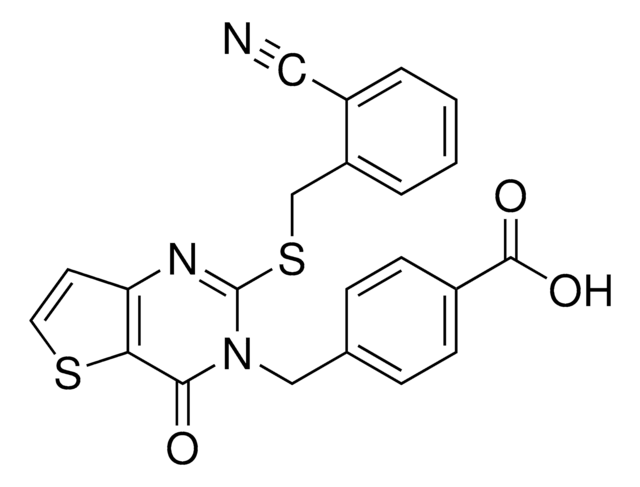N4148
S-Nitrosoglutathione
≥97%
Sinónimos:
GSNO, SNOG
About This Item
Productos recomendados
Quality Level
assay
≥97%
form
powder
solubility
water: soluble 19.60-20.40 mg/mL
storage temp.
−20°C
SMILES string
N[C@@H](CCC(=O)N[C@@H](CSN=O)C(=O)NCC(O)=O)C(O)=O
InChI
1S/C10H16N4O7S/c11-5(10(19)20)1-2-7(15)13-6(4-22-14-21)9(18)12-3-8(16)17/h5-6H,1-4,11H2,(H,12,18)(H,13,15)(H,16,17)(H,19,20)/t5-,6-/m0/s1
InChI key
HYHSBSXUHZOYLX-WDSKDSINSA-N
General description
Application
- as a standard in reversed phase chromatography coupled to chemical vapour generation and atomic fluorescence detector (RPC-CVGAFS) and reversed phase chromatography fluorimetric (RPC-FD).
- as a standard in spectrophotometric and high-performance liquid chromatography (HPLC) assay.
Biochem/physiol Actions
Storage Class
11 - Combustible Solids
wgk_germany
WGK 3
ppe
dust mask type N95 (US), Eyeshields, Gloves
Elija entre una de las versiones más recientes:
Certificados de análisis (COA)
¿No ve la versión correcta?
Si necesita una versión concreta, puede buscar un certificado específico por el número de lote.
¿Ya tiene este producto?
Encuentre la documentación para los productos que ha comprado recientemente en la Biblioteca de documentos.
Los clientes también vieron
Nuestro equipo de científicos tiene experiencia en todas las áreas de investigación: Ciencias de la vida, Ciencia de los materiales, Síntesis química, Cromatografía, Analítica y muchas otras.
Póngase en contacto con el Servicio técnico











